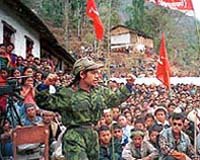| . |  |
. |
Kabul, Afghanistan (UPI) Aug 19, 2010 The real enemy in Afghanistan is reactionary leadership represented by corrupt politicians, ruthless warlords and the twisted religious extremism of the Taliban. That fundamental problem is complicated by the parallel competition of international players to influence the future of Afghanistan according to their own national interests. Several congressional, military and independent reports have expressed concern over the rise in corruption at every level in Afghan government. In contrast, Afghan officials claim that reforms have been implemented and progress has been made in reducing administration corruption and land usurpation (Note: "progress has been made" is the most frequently used phrase made during briefings in Afghanistan). Maybe, but supply convoys, funded by taxpayer dollars, still routinely pay bribes to militias or police to allow them to pass checkpoints. Part of the profits from this extortion scheme ends up as kickbacks into the hands of Afghan government officials, who have been known to boldly count the cash on their ministry desks. As reported by Joel van Houdt for The Wall Street Journal, when U.S.-trained agents from an anti-corruption task force raided the New Ansari exchange, the headquarters of the nation's largest "hawala" money-transfer business, they found evidence linking apparent illegal activities to some of the most powerful political and business figures in the country, including relatives of Afghan President Hamid Karzai. Before the raid New Ansari allegedly helped to launder profits from the illicit opium trade and moving money earned by the Taliban through extortion and drug trafficking. According to van Houdt, the Karzai government was quick to take more direct control of the coalition-initiated anti-corruption activities, regarded by senior U.S. military and civilian officials as a move to protect those close to him and quash the investigation into New Ansari. These aren't simply activities requiring criminal investigations and prosecution. Chronic official corruption undermines the war effort by decreasing confidence in the central government and increasing support for the Taliban. The pivotal campaign to secure Kandahar could be dependent on the cooperation of Ahmad Wali Karzai, the president's half-brother, who is head of Kandahar's provincial council but who also has been accused of corruption and having links to the drug trade. Some Afghan government officials are providing weapons to the Taliban and opposition leaders try to leverage Taliban attacks, even in their own provinces, to weaken support for the Karzai government and promote their own political agenda. The Taliban impose order through fear, intimidation and applying a particularly primitive and brutal interpretation of Islam. The Taliban are religious extremists, who don't respect Afghan tribal traditions and who possess foreign pan-Islamic ambitions not in tune with the needs and desires of the Afghan people. Warlords exert their power and influence by maintaining militias, engaging in the drug trade and other corrupt practices and stir up ethnic tension by generating fear of tribal hegemony. Ethnic tensions are indeed increasing in Afghanistan. This is at least partially due to Karzai's peace initiative to the Taliban, which many Afghans consider far too generous. In a recent speech, Karzai didn't mention two main conditions for peace negotiations with the Taliban, acceptance of Afghanistan constitution and the laying down their arms. The Afghan president even went so far as to consult the country's Muslim clergy leadership (Council of Religious Bodies), who not only endorsed his peace initiative but supported the full enforcement of a strict interpretation of Shariah law. Afghanistan's liberal democratic media have begun to express great concern about the potential Talibanization of the Afghan government and the return of religious extremism, past persecution of non-Pashtun minorities and the subjugation of women. The last, best hope for Afghanistan is the emergence of a new generation of leaders who reject the divisive and predatory policies of the corrupt politicians, warlords and the Taliban. None of these groups currently contending for power provide a suitable foundation to build for the future. The coalition has the right strategy and leadership but without the proper partner, genuine progress won't be achieved. Ultimately, success and the justification of the sacrifices made will be determined by what we leave behind and whether it endures. (Lawrence Sellin, Ph.D., is a colonel in the U.S. Army Reserve and a veteran of the conflicts in Afghanistan and Iraq. He is currently serving his second deployment to Afghanistan. The views expressed are his own and do not necessarily reflect those of the U.S. Army or U.S. government.) (United Press International's "Outside View" commentaries are written by outside contributors who specialize in a variety of important issues. The views expressed do not necessarily reflect those of United Press International. In the interests of creating an open forum, original submissions are invited.)
Share This Article With Planet Earth
Related Links News From Across The Stans
 Indian Maoists move toward a cease-fire
Indian Maoists move toward a cease-fireNew Delhi (UPI) Aug 18, 2010 A senior Maoist insurgency leader has proposed a simultaneous cease-fire between rebels and the Indian government to allow for peace talks to begin. Koteswara Rao made the offer in radio interviews with Bengali media. The offer came two days after Indian President Pratibha Patil and Prime Minister Manmohan Singh asked the Maoists to declare a cease-fire and return to the discussi ... read more |
|
| The content herein, unless otherwise known to be public domain, are Copyright 1995-2010 - SpaceDaily. AFP and UPI Wire Stories are copyright Agence France-Presse and United Press International. ESA Portal Reports are copyright European Space Agency. All NASA sourced material is public domain. Additional copyrights may apply in whole or part to other bona fide parties. Advertising does not imply endorsement,agreement or approval of any opinions, statements or information provided by SpaceDaily on any Web page published or hosted by SpaceDaily. Privacy Statement |